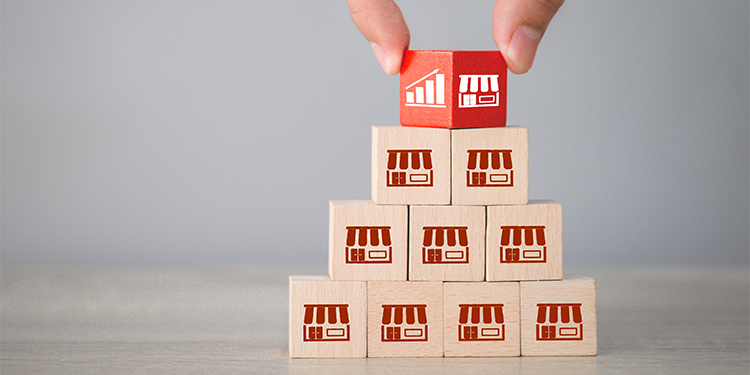
How To Buy a Small Business: An Overview
Small businesses power the American economy, comprising 99.9% of all businesses in the United States. The decision to own a small business is a no-brainer for many Americans, but what’s often not as clear are the steps you must take to buy a small business.
Read on to learn how to choose the right industry, find sellers, what to look for in a business, how to finance the purchase, due diligence steps, and how to close the deal.
Narrowing Down Your Industry
The industry you choose as you investigate how to buy a business will affect the rest of the purchase process, so you will want to narrow down your options at the start of your search. Typically, a small business owner may gravitate toward an industry they’re already familiar with, but this doesn’t have to be the case.
You can be just as successful if you take the time to learn about an industry you have little to no experience in, as long as you do your due diligence and gain a comprehensive understanding of that industry. You can also choose to bring on partners or consultants who have a firm grasp of how the industry works and potential challenges.
Is It Better to Buy a Business or Start From Scratch?
Advantages of Buying an Existing Business
- Proven Business Model: An established business has already demonstrated that its business model works, reducing the risk and uncertainty associated with starting a new venture.
- Existing Cash Flow: Buying a business with existing cash flow can provide immediate revenue and help cover expenses from day one.
- Established Customer Base: An existing business comes with a customer base that is familiar with the company's products or services, which can help maintain a steady stream of revenue.
- Brand Recognition: Established businesses often have a recognized brand, which can help attract new customers and maintain the loyalty of existing ones.
- Trained Employees: Many businesses come with experienced employees who are familiar with the company's operations, reducing the time and resources needed to train new staff.
- Existing Infrastructure: Established businesses often have systems in place for accounting, purchasing, sales, and marketing, which can save time and money when compared to setting up these processes from scratch.
Finding Sellers
Locating a seller is easy. The trick is to find the right seller and not just someone looking to offload a failing business. To avoid finding the wrong kinds of sellers or buying companies that will cost more than they make, it’s usually best to use a service that not only lists businesses for sale but also has staff that can help you evaluate your options.
How Do You Approach a Business Owner to Buy a Business?
It’s important to be upfront with the seller about your needs. This will avoid wasting their time or yours. If you’re looking for a specific profit margin, you will want to convey that to them. If your primary concern is how well they’re positioned in the market, you should put that front and center as well.
On the other hand, if you look forward to drumming up new business and have a vision for how you can grow or change the company, that should be put on the table, too. Being honest about your needs and the business’s direction has several benefits:
- If the seller knows they can meet most of your needs but not all, they may be more willing to be flexible on the price — knowing the business may not present a comprehensive value proposition for you.
- In many situations, the seller can offer concrete, actionable advice on how to attain your vision for the business.
- A seller may have already tried something you’re considering, and their feedback could be useful.
- Knowing the ratios you require, the seller may be able to settle debts, sell off or acquire inventory, or devise a way of making the business run leaner to meet your needs.
Things to Evaluate about the Business
Is buying a small business a good investment? Yes. You need to keep in mind, however, that in many ways, finding the right business is like finding a good friend or marriage partner: You have to know the intricacies behind what makes it run, including its history.
Many companies, like people, have gone through rough times. This may have affected their profitability in a variety of ways, and the new direction in which you plan to take the business can help heal an old wound. For example:
- If the company has bad, expensive debt, it can be refinanced.
- If there are employees who haven’t performed up to par, they could be replaced.
- If the cost of goods sold is too high, you may be able to find ways to reduce unnecessary expenses.
The only way to get a decent idea about how the business will fare after you buy it is to perform an evaluation. This will come down to asking the right questions.
What Questions Should I Ask When Buying a Business?
Even though the questions you choose to ask will vary based on the business, regardless of the industry or specific sector, here are some of the most important things to ask about:
- Financial statements
- Accounts payable and receivable
- Physical assets
- Depreciation schedule for physical assets
- Intangible assets
- Inventory list
- Contracts with suppliers and distributors
- Articles of incorporation or formation
- List of shareholders, partners, and executives
- Existing insurance policies
- Outstanding loan agreements
- Manuals pertaining to employee policies
- Professional certifications of key employees or partners
- The current organization chart showing who different people report to
In addition to what’s above, you need to ask some specific questions that may be difficult to answer with a concrete figure or chart. Some of these include:
- What has been the biggest challenge the business has faced?
- Why are you selling the business?
- If you were going to give this business to a close family member, what advice would you give them?
- What’s the biggest mistake you feel you’ve made throughout your time owning the business?
While some of these questions may seem a bit personal, many business sellers will be happy to answer them. They are reasonable queries — the same things the owner would want to know if they were in your shoes.
Financing the Business
As you investigate how to buy a business, you will likely find that you have more options when buying a business than when purchasing other goods or services. While some people may shy away from financing, it’s a normal aspect of running a business and a common expense. Your first step — before pursuing financing options — is to figure out how much money you need.
How Much Money Do You Need to Buy a Small Business?
While the money you need when buying a small business will vary according to the company you have in mind, it’s often best to focus on the amount you will need for a down payment first. If you’re able to get this amount together, then you’ll have more options when it comes to financing, and you may be able to adjust your price ceiling, either up or down.
It’s typical for lenders to ask for between 10% and 30% down when financing the purchase of a small business. This provides a good starting point when you’re figuring out how much money you need to have to buy the business. Here are some steps you should take to figure out the range of funds you will need — both out of pocket and from financing:
- Research the prices of businesses in your desired industry and come up with a price range. For example, the average small business in your industry may sell for between $1,000,000 and $1,500,000.
- Choose an amount in the higher end of that price range, such as $1,400,000.
- Aim to set aside or raise around 30% of that amount. For many lenders, this is more than enough to secure the loan. In this case, 30% of $1,400,000 would be $420,000.
- Ascertain approximately how much the businesses in which you’re interested could net on a monthly basis. This will be income after paying employees, rent, inventory, and various overhead expenses. For this example, suppose the net income is $17,000 per month.
- Choose the loan terms you’re most comfortable with, particularly the overall length of the loan in months. For 15 years, that would be 180 months, for example.
- Ask lenders about their rates.
This process will give you two important figures you can use to calculate how much money you need:
- What you need upfront
- What the business needs to make to pay for the financing costs
Even though your numbers don’t take into account tax deductions, depreciation, and other factors in determining net profit, they still give you a good ballpark figure of what you need to have and what the business needs to produce.
Using the numbers above, starting with a price tag of $1,400,000, we get the following:
- Price of business: $1,400,000
- Down payment: $420,000
- Amount borrowed: $980,000
- Loan term: 15 years (180 months)
- Example interest rate: 6%
- Monthly payment: $8,269.80
- Amount the business brings to the table: $17,000
- “Breathing room” after paying monthly loan: $8,730.20
If this number is adequate for your needs and plans for the business, you’re good to go. However, if it’s not enough, you may have to either look for another company or try to negotiate with the seller or the lender to get the numbers down.
Due Diligence
Performing due diligence as you figure out how to buy a business involves more than just making sure you know what you’re getting into. When doing your due diligence, your objective is to get a three-way glimpse into the company’s past, present, and future.
Past numbers may reveal strengths or weaknesses that the seller was able to build upon or overcome. Compared with current data, older figures may also indicate a failure to capitalize on an opportunity or think creatively to overcome a challenge.
Current numbers, when compared to past figures, will reveal the financial trajectory of the business. This is important. If there is a trend — either positive or negative — it will be hard to reverse.
Here are the things you need to investigate before buying, step-by-step:
11 Steps for Evaluating a Small Business
- Collect financial statements going back at least three years,
- Get a list of all the business payments on a periodic basis, such as every month or quarter.
- Get a breakdown of all outstanding loans the business is responsible for, including real estate and business credit card debt.
- Get an outline of payroll and wage expenses.
- Obtain a list of all physical assets.
- Get a breakdown of the depreciation schedule for the physical assets.
- Obtain recent and historical lists of inventories.
- If the business has investments, obtain a breakdown of these, their most recent earnings, and their past performances.
- Obtain a list of current contracts with both vendors and clients.
- Bring this information to a company or consultant to perform a financial analysis of the business, and figure out, with their help, the pieces of the puzzle that may still be missing.
- Go back to the seller to request any additional information needed.
A company with an upward trend in revenue has the kind of momentum you need for a smooth transition of ownership. However, a slumping trend may require more effort and innovative solutions than you have the time or resources for.
Close the Deal
When closing the deal, you have several options:
- Buy the business outright, assuming full ownership without any involvement from the seller or any of their partners.
- Buy the business but keep the seller engaged for a time to help with the transition. In this case, the seller would typically have at least an advisory role to help ensure a smooth transition.
- Buy the business while offering shares to the seller. With this approach, you still take complete control of the business, but you offer the seller shares, which may allow them to receive passive income in the form of dividends. In some situations, this can be an effective way of getting the seller to reduce the sales price.
- Buy the business gradually. In this scenario, you make periodic payments, each going toward a total price you and the seller have agreed upon. In effect, you’re financing the purchase of the business.
- Buy the business but provide the seller with a regular income for a time period. This may encourage the seller to reduce the purchase price because they will still make money. The seller becomes like a preferred stockholder that gets paid every month. This works particularly well if the seller wants to retire but isn’t yet old enough to get 100% of their retirement benefits.
Buying a small business is a rewarding way to own your own company while avoiding much of the uncertainty and expense of growing a business from scratch. To find your ideal small business, search through BizQuest's business listings now.





